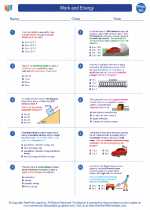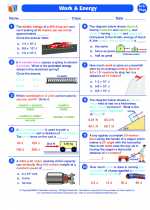Cooperation in Physics
Cooperation is a fundamental concept in physics that refers to the interaction of multiple objects or systems to achieve a common goal. In the context of physics, cooperation can be observed in various phenomena and processes, from the behavior of atomic particles to the dynamics of celestial bodies.
Key Concepts
There are several key concepts related to cooperation in physics:
- Newton's Third Law of Motion: According to Newton's third law, for every action, there is an equal and opposite reaction. This principle illustrates the idea of cooperation between interacting objects, where the forces exerted by the objects on each other are always equal in magnitude and opposite in direction.
- Cooperative Systems: In physics, cooperative systems refer to collections of particles or components that interact with each other in a coordinated manner. Examples include the behavior of magnetic dipoles in a ferromagnetic material or the synchronized motion of coupled oscillators.
- Quantum Entanglement: Quantum entanglement is a phenomenon in quantum mechanics where the properties of particles become correlated in such a way that the state of one particle is dependent on the state of another, regardless of the distance between them. This concept highlights the non-local cooperation between quantum entities.
Applications
The concept of cooperation in physics has numerous applications across different branches of the field:
- Particle Physics: In the study of subatomic particles, cooperation is essential for understanding the behavior of particles in particle accelerators and the interactions between fundamental forces.
- Condensed Matter Physics: Cooperative phenomena are central to the study of phase transitions, superconductivity, and magnetism in materials, where the collective behavior of particles leads to emergent properties.
- Astrophysics: Cooperation is evident in the gravitational interactions among celestial bodies, the dynamics of star clusters, and the formation of large-scale structures in the universe.
Study Guide
To gain a comprehensive understanding of cooperation in physics, consider the following study guide:
- Review the principles of Newton's third law of motion and apply it to various mechanical systems to analyze the cooperative nature of forces.
- Explore the concept of cooperative behavior in quantum systems, particularly focusing on entanglement and its implications for quantum information and computing.
- Investigate the role of cooperation in condensed matter systems, such as the emergence of collective phenomena in magnetic materials and superfluids.
- Examine astrophysical phenomena that demonstrate cooperative interactions, including the gravitational dynamics of celestial objects and the cosmological implications of large-scale cooperation in the universe.
By engaging with these key concepts and applications, you can develop a deeper appreciation for the role of cooperation in shaping the behavior of physical systems at different scales.
.◂Physics Worksheets and Study Guides High School. Work and Energy

 Worksheet/Answer key
Worksheet/Answer key
 Worksheet/Answer key
Worksheet/Answer key
 Worksheet/Answer key
Worksheet/Answer key
